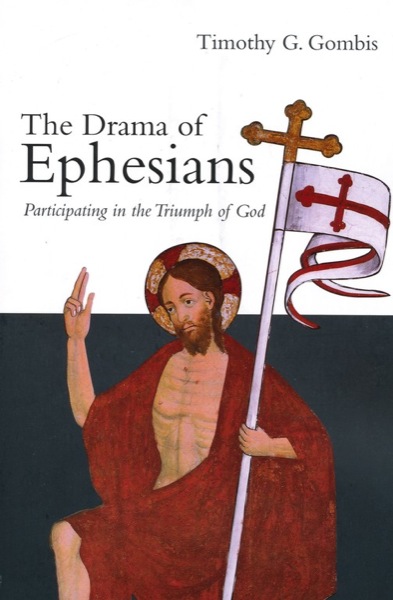 Review of Timothy G. Gombis, The Drama of Ephesians: Participating in the Triumph of God (Downers Grove: InterVarsity Press, 2010).
Review of Timothy G. Gombis, The Drama of Ephesians: Participating in the Triumph of God (Downers Grove: InterVarsity Press, 2010).
This is an exciting book, and there are so many angles that one could take in a review. Since I am not an expert in New Testament studies, however, I will not spend time evaluating Gombis’s particular way of reading Ephesians as structured by the theme of divine warfare. Perhaps those more familiar with this theme in biblical studies will be able to add their comments to this post. But as someone researching theatre and Christian ethics at the Institute for Theology, Imagination, and the Arts, I am most interested in the use of the dramatic model in this book, and the extent to which it enriches this exploration of Ephesians.
In chapter one, Gombis describes his rationale for utilizing a dramatic model instead of another model such as story: 1) drama is more accurate than viewing Ephesians as a doctrinal treatise, 2) drama emphasizes the need to perform this script, 3) drama involves our imagination, 4) drama engages the whole person and community, and 5) drama requires improvisation when actors encounter a different context. In what follows, I want to engage briefly with each of these reasons Gombis articulates for utilizing drama as a model.
First, Gombis is right to be wary about approaching Ephesians merely to extract theological truths. Paul is definitely doing more than commenting on doctrinal issues; he is offering a breathtaking vision of the “reality-altering, cosmos-transforming act of God in Christ” (15). But in doing so, Paul is also commenting on doctrinal issues, and we would be remiss not to follow his lead. Predestination may be an unpopular topic, but Paul addressed it directly, and so should we. The key is, of course, to recognize as Dorothy Sayers did that “the dogma is the drama.”
Second, it is absolutely essential not just to understand Scripture, but to participate in the reality it presents. Gombis follows the most popular way of articulating this in a dramatic model, that is, using the metaphor of script. In my opinion, however, there are several problems with this metaphor, the most obvious one being that Scripture does not tell us exactly how to act out our roles. I am glad to see that Gombis emphasizes improvisation, but then it is confusing to insist that “actors need a script” (85).
Third, taking Ephesians as a drama certainly engages our imaginations, but does it really do so in the same way as contemporary advertising that battles for the control of our imaginations? In his conclusion to chapter three, Gombis begins to explain how practices and symbols need to be “harnessed to reinforce our Christian identity,” by which I think he means to say that practices and symbols have incredible power to shape our imaginations. The text of Ephesians can capture our imaginations, but it does so all the more when Christians embody its vision through concrete practices and creative acts.
Fourth, the previous point reinforces the importance of the whole person and community in understanding and participating in the biblical drama. In short, we need to see this drama being acted out before our eyes if it is going to capture our imaginations and sweep us along in its trajectory. Gombis rightly mentions the importance of models—preeminently in Jesus but also in Paul—for what it looks like for the biblical drama to be performed. What could have been emphasized more, however, is the power of Christian performances throughout history, and the ways in which everyday saints in different parts of the world have modeled what it looks like to participate in the triumph of God. We certainly improvise off Jesus and Paul, but we improvise off every other performance of God’s people as well.
Speaking of improvisation, I loved this emphasis throughout the book, and agree that improvisation is necessary if we are to perform the biblical drama in new situations (172). I realize that this is intended for a more popular audience, but I was a bit surprised that Gombis made no reference to other scholars employing improvisation as a model for Christian ethics, particularly Sam Wells and his Improvisation: The Drama of Christian Ethics. Even a cursory interaction with Wells would have helped Gombis clarify what is involved in developing the skill of improvisation.
So, did it pay off for Gombis to utilize a dramatic model throughout his book? In my opinion, I think it did enrich the way in which Ephesians engages our imaginations and invites our performance of its vision. But I also believe that a dramatic model has more potential power than it actually wielded for Gombis, partly because drama remained a convenient metaphor instead of a comprehensive model, entering into conversation with theatre so that it provides heuristic insights. Nevertheless, Gombis makes a convincing case that Ephesians is calling us to commit to cruciform and subversive performances, and for this powerful point alone, this book is a valuable read.




Thanks for this interesting review, Wes. While I am sympathetic to the dramatic model and have found Samuel Wells’ work very helpful, I am still not convinced that such a model ought to be a “comprehensive model” for reading Ephesians. Where do you see the limits of dramatic reading for scripture?
As I indicated in the review, I think drama (or more accurately: theatre) is a superb model for understanding Scripture and relating it to Christian living. I think one of the limits, as I indicated in this post (http://itiablog.wordpress.com/2010/10/27/if-scripture-is-not-a-script-then-what-is-it/) is that Scripture is not like an ordinary play script, because it both witnesses to parts of the drama that have already happened as a transcript and calls for further participation in that same drama like a particular kind of prescript. Because Scripture is comprised of various literary genres, I think it is key to recognize the different ways in which they transcribe and prescribe the theodrama, rather than doing this in one uniform way.
It is also good to point out that while theatre is a fitting model, it does not need to be the only one, and I think there is great value in having multiple models that approach interpreting and inhabiting Scripture from a variety of angles.
Wes, thanks for your review. It is really interesting to see how a dramatic model could be applied to scripture. I had one question regarding the metaphor of script. You said that “there are several problems with this metaphor, the most obvious one being that Scripture does not tell us exactly how to act out our roles.” I was curious if anyone actually thinks that dramatic scripts “tell us exactly how to act our roles.” In the few plays that I have participated in the script leaves a lot for the actor to figure our him or herself. I wonder if the script could instead be seen as that which makes possible the actors improvisation rather than that which prescribes all of the actors actions. What do you think?
In stating that Scripture does not tell us exactly how to act out, what I mean more specifically is that Scripture does not provide dialogue and stage directions that are enacted by a company of actors performing the script. As I mentioned in response to Sam, Scripture more accurately witnesses to past performances and generates new performances in a more paradigmatic, imaginative way.
You are right, of course, that a script leaves much to the actors’ imaginations and makes possible their improvisation, but what the metaphor still lacks is any references to pre-scriptural performances to which Scripture is a witness. I think the other metaphors (transcript and prescript) maintain the theatrical model while being more attentive to place of Scripture in theodrama.
Thanks, Wes, for engaging my work! A few points of response:
First, I am indeed a biblical scholar utilizing a dramatic model, so I do leave myself open to criticism where I either do not use it properly or fail to exploit its fullest potential. I used drama as a heuristic device, however, a model to express how the rhetoric of Ephesians functions for Paul’s intended audiences. I agree that this model doesn’t fully exhaust the rhetorical and theological potential of the letter. When the book that does is written, I will be the first to congratulate its author!
Second, to your first point, I am trying to overturn precisely the Scripture-reading strategy you articulate. I believe it is inappropriate to regard Paul as “commenting on doctrinal issues,” or “addressing” difficult subjects such as predestination. Theological “topics” are indeed present throughout the letter, but they do not appear as “topics.” Far from employing drama to “soften” predestination, I did so to capture how predestination functions in Ephesians and in the rest of Scripture. It is never merely a theological topic but appears throughout the OT to construct the character of Israel, God’s missional people. Paul employs the terms “chosen” and “predestined” to construct gospel characters as those specially chosen by God to be agents of God’s redemptive love to the nations. It is only because I was trying to “follow Paul’s lead” that I employed drama and the notion of character construction in that chapter. I think it’s more faithful to Paul’s rhetorical intentions.
Third, in disagreement with your second criticism viz. the metaphor of script, I’m wondering if you’re doing justice to the character of scripts and Scripture. Good scripts, like all good stories, are typically loaded with potential that good actors will explore and exploit. Further, groups of actors will adapt their performance to venues and audiences. Scripts, then, while constraining performances, open them up and invite varieties of performance. Further, Ephesians functions far better as script than at first glance. It provides a number of prescriptions for communal performances (chapters 4-6), while also calling on actors to improvise for new situations (Eph 5:10). So, I don’t think that good scripts “tell us exactly how to act out our roles,” and I would note that Ephesians both calls for performance and allows for improvisation of gospel action in new settings and situations.
Fourth, all I can say to your third point is, “yes!” Faithful churches are wise to construct and invent symbols and practices that draw upon and draw us into the gospel narrative. So much to say here, but I’ll leave it to the good folks in ITIA to bless Christian communities with material to enliven imaginations with gospel hope!
Fifth, I’m aware of Sam Wells’s work, and consulting it would doubtless have improved my book, but I tried to utilize the dramatic framework in order to deliver the goods that Ephesians offered and tried to keep the scaffolding (nuanced articulations of improvisation) in the background. Further, I wrote for lay people who are less interested in knowing that I’ve done my homework than if I were writing for my colleagues. For that reason I didn’t refer much at all to the good work of others on Ephesians or on drama.
In the end, I may indeed be open to critique on my use of drama, since I used it as a heuristic device to deliver a richer reading of Ephesians. I can’t really argue with your judgment that I have not tapped a dramatic model’s full potential, but again, I will celebrate those whose work does!
Thanks again, Wes!
tg
Thanks for your response, Tim, and for your great follow-up comments!
You are right that Paul does not “comment on doctrinal issues” in a way isolated from the overall biblical drama. I only meant to emphasize that Paul does not avoid doctrine, but rather see doctrine as describing the stunning drama in which the Ephesians are situated. I completely agree with you regarding Paul’s rhetorical intentions.
Regarding your point about Ephesians as a script, I addressed this in part above, acknowledging the fact that I spoke too strongly about a script telling us exactly how to act out our roles. Nevertheless, as I articulated in the comment above, a script calls for performances, rather than testifies to past performances. This is why I think it is a bit more nuanced to speak of Scripture as transcript and prescript.
I definitely understand and respect your desire to keep the scholarly scaffolding in the background, and I think this was one element that contributed to an interesting and riveting read. It may have been beneficial, however, to at least mention some of these resources in an appendix or bibliography so that people know where to go if they want to dig in more. I think your book would motivate people to learn more, and they would be eager for suggestions.
Despite some of critiques I mention in this short review, I would not hesitate to recommend this book to others and to commend its compelling articulation of the drama of Ephesians. So thanks for your work, and thanks for responding to the review.